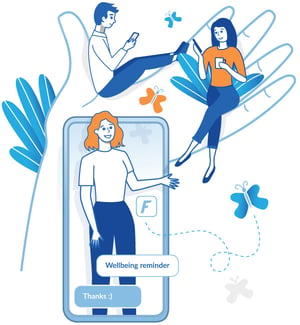 In our last blog, we presented three core principles that serve as anchor points for best practice digital learning. One of these anchor points was the idea of ‘little and often’ which is scrutinized more deeply in this post.
In our last blog, we presented three core principles that serve as anchor points for best practice digital learning. One of these anchor points was the idea of ‘little and often’ which is scrutinized more deeply in this post.
The human brain is a wonderful piece of (biological) technology. It is literally designed to quickly let go of millions of bits of data (in the form of images, words, and sounds) it encounters daily while selectively storing only small amounts into memory. Our biological approach, to data management, can easily work against us remembering the things we learn!
When you combine the brain’s preference to quickly jettison data with the demands of modern learners who have only 4.2 minutes a day to learn, the value of ‘little and often’ becomes clearer.
If the brain needs to be ‘prompted’ to store knowledge (achieved through learning) and this prompting needs to fit in with the demands of a modern lifestyle; it makes sense that learning experiences should be little…
given that the experiences will be easier to store…
and therefore, will require less prompting…
and the experiences can more easily be squeezed in between other priorities and responsibilities the learner is managing.
But what does ‘little’ look like?
 Microlearning provides one way of visualising ‘little’ digital experiences. Microlearning uses short, focused interactions targeting an increase in learners’ knowledge and skills across a single topic.
Microlearning provides one way of visualising ‘little’ digital experiences. Microlearning uses short, focused interactions targeting an increase in learners’ knowledge and skills across a single topic.
Microlearning fits seamlessly into modern learners ‘bite-sized lives’ – where everyone is multitasking and quickly changing between modes of work, travel and socialising.
As a result, microlearning needs to be ubiquitous… learning needs to happen everywhere (in fact anywhere) and whenever the learner has time. But it doesn’t mean we flood or inundate learners… it’s about establishing a personalised rhythm (that fits within a negotiated organisational schedule or program).
Little = Chunks
Chunking provides another way of visualising ‘little’ digital learning experiences. Chunking helps us get around the short-term memory challenge which is based on the observations that the average learner can only manage seven pieces of information in short-term memory, at a time.
By chunking complex concepts into a sequence of little ideas. We support the learner to progress over time to the complex concept by adding one little idea to another little idea… and so on. Chunking helps us avoid cognitive overload and helps create new neural patterns which is the basis of learning.
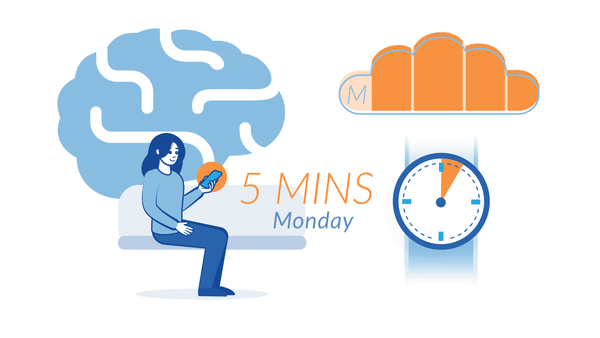 Micro-learning is a form of ‘digital chunking’… and just like Barbara Oakley says:
Micro-learning is a form of ‘digital chunking’… and just like Barbara Oakley says:
“Chunking is the mother of all learning — or at least the fairy godmother!”
And Barbara should know; she does after all co-teach the world's largest online course: “Learning How to Learn”.
The Big Advantage of ‘Little’
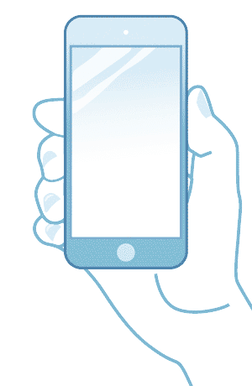 So, our brain and our digitally dependent lifestyles can take advantage of an approach to learning that chunks knowledge and skills into microlearning experiences that are continuously consumed at a time and place set by the learner.
So, our brain and our digitally dependent lifestyles can take advantage of an approach to learning that chunks knowledge and skills into microlearning experiences that are continuously consumed at a time and place set by the learner.
Consistently engaging with a supply of digital learning chunks establishes a rhythm and learning becomes habitual.
If this all makes sense, then why isn’t everyone adopting a ‘little and often’ strategy?
Why do our designs rely so heavily on intensive training rather than consistent training?
We need to find a way to support continuous, habitual learning using easily accessible stream of chunked digital experiences!

Since about 2014
 Most research indicates mobile use levels have outstripped time spent on ‘traditional’ computers such as laptop since about 2014. And as part of this trend we have witnessed the rise of mobile ‘apps’.
Most research indicates mobile use levels have outstripped time spent on ‘traditional’ computers such as laptop since about 2014. And as part of this trend we have witnessed the rise of mobile ‘apps’.
Interestingly app users tend to adopt a “little and often” approach – users swap quickly from app to app as part of the bite-sized lifestyle.
The mobile phone-app environment tends to encourage consistent (and frequent) engagement over irregular intense engagement.
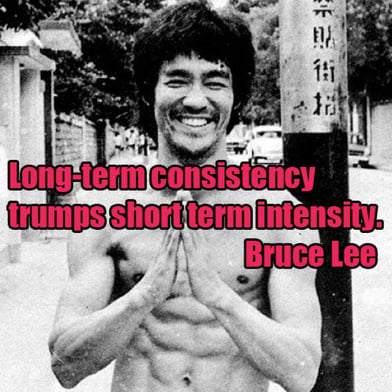 Consistency vs Intensity
Consistency vs Intensity
When it comes to comparing consistency and intensity, Bruce Lee has this space covered… check Google out if you don’t believe me!
Simon Sinek emphasises the importance of consistency… he believes if you are interested in outcomes focus on consistency!
Simon believes we like intensity “because it is easy to measure”!
Pete Huang compares examples and the benefits of intense versus consistent learning regimes.
Of most interest is the learning approach designed by Karen Cheng called “Give It 100”. The "Give it 100" approach proposes and supports the concept of a 100-day challenge. Karen Cheng argues that through consistent application over 100 days you can gradually but confidently improve knowledge, skills and performance in a targeted area. Everyday learners share a 10-second video of their progress, tracking achievements every step of the way.
To support the modern learner build a continuous learning habit we need to:
- promote the consistent and frequent use of chunked digital experiences
- make chunked experiences accessible via apps
- encourage sustained participation by tracking and sharing gradual improvements and mastery!
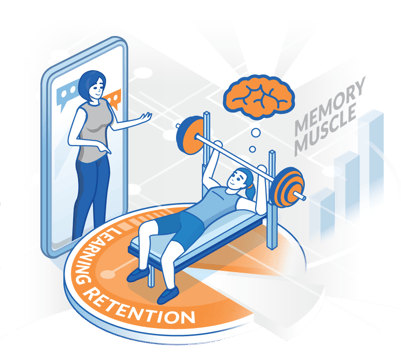 APP Learning
APP Learning
We can see examples of how little and often, delivered by an app, changes people through weight-loss programs, fitness programs, the “Give it 100” strategy and even language training programs. So why not leverage this successful formula and drive workplace learning through the roof in your organisation?
It's in your hands… you can remain committed to intensive approaches to learning because they are what people expect and they are easy to measure. Or you can explore the potential benefits of building a continuous learning habit that delivers sustainable improvements over time.
My guess is that if you are still reading this post, you’re committed to the concept of ‘little and often’ and you subscribe to the benefits of a continuous learning habit in the workplace. Low-cost technology is already available in the market to support your exploration of these ideas.
But maybe before you start downloading apps and working out which one provides both value for money and the outcomes your organisation needs… think about building support inside your organisation for a pilot or test & learn strategy that shifts the focus from intensive learning to consistent learning rhythms
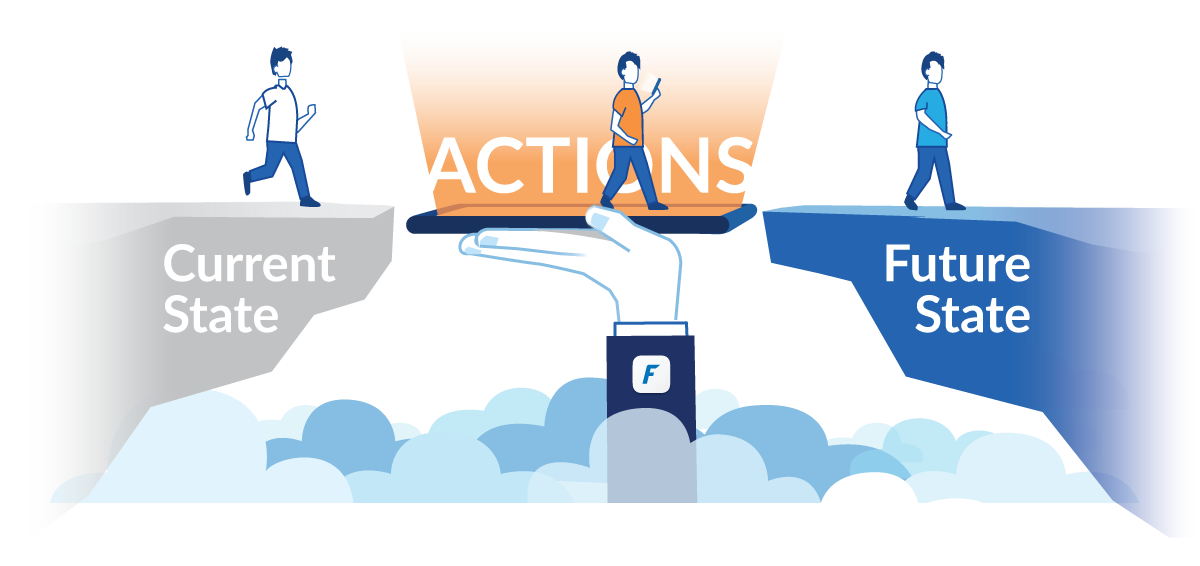
I’m committed to helping our clients build the competence and confidence of their teams. To subscribe to this blog send your email below.

 In every superhero story there has to be a super-villain. And ours is no exception. The villain in our story is traditional learning and it has been around (and doing the same thing) for a very long time.
In every superhero story there has to be a super-villain. And ours is no exception. The villain in our story is traditional learning and it has been around (and doing the same thing) for a very long time.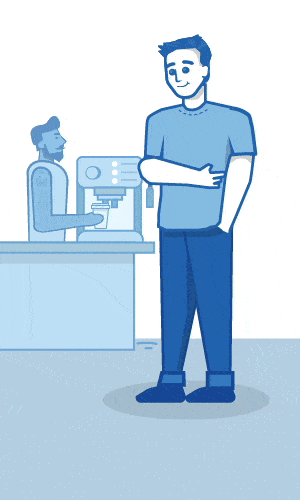 Remember the name
Remember the name  Our superpower doesn’t come from the sun or from a radioactive spider. It comes from
Our superpower doesn’t come from the sun or from a radioactive spider. It comes from 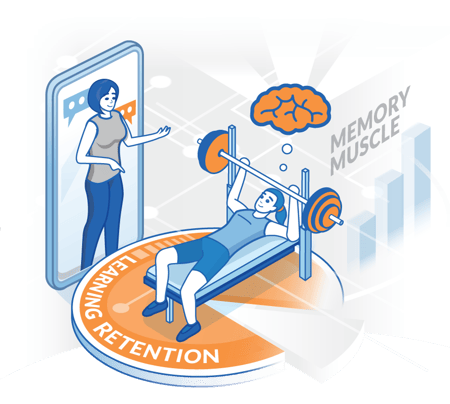 How Forget Me Not can super-power up your training
How Forget Me Not can super-power up your training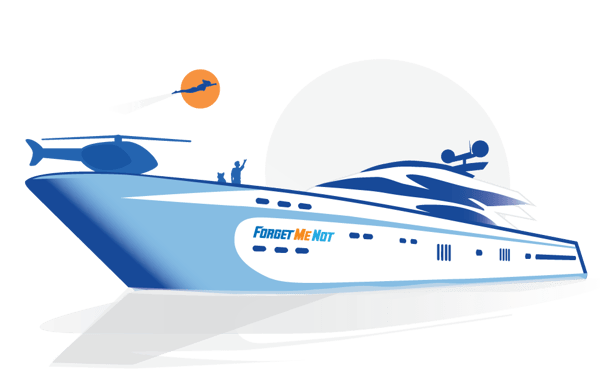

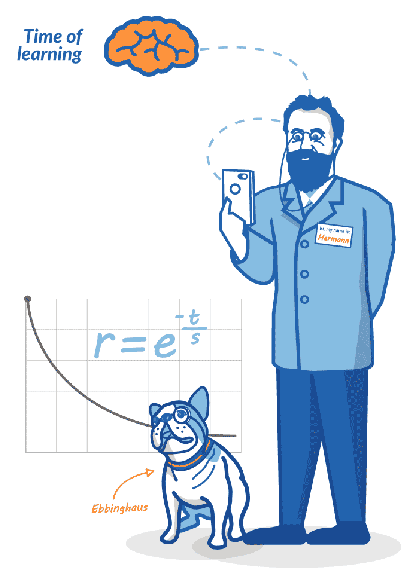 To further compound the problem of traditional training, recent replicated studies of the
To further compound the problem of traditional training, recent replicated studies of the 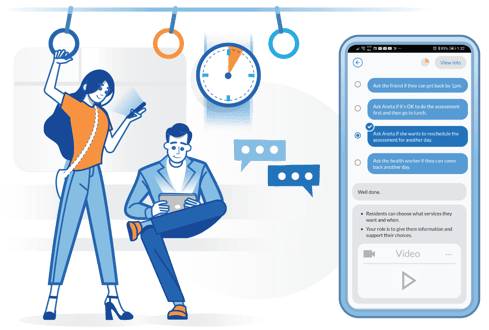 Questions are a powerful learning tool but …
Questions are a powerful learning tool but …